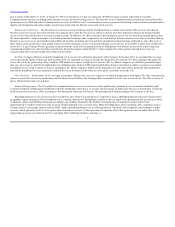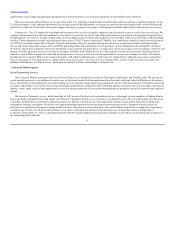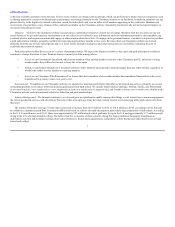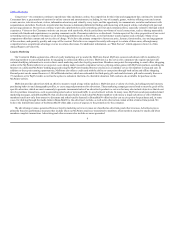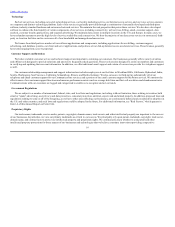Juno 2014 Annual Report Download - page 16
Download and view the complete annual report
Please find page 16 of the 2014 Juno annual report below. You can navigate through the pages in the report by either clicking on the pages listed below, or by using the keyword search tool below to find specific information within the annual report.
Table of Contents
Matters" of the Notes to Consolidated Financial Statements included in Part II, Item 8 of this Annual Report on Form 10-K.
Governmental regulation of the collection and use of personal information or our failure to comply with these regulations could harm our businesses.
The FTC has regulations regarding the collection and use of personal information obtained from individuals when accessing websites, with particular
emphasis on access by minors. In addition, other governmental authorities have regulations to govern the collection and use of personal information that may
be obtained from individuals when accessing websites. These regulations include requirements that procedures be established to disclose and notify users of
our websites or mobile apps of our privacy and security policies, obtain consent from users for collection and use of personal information, and provide users
with the ability to access, correct, or delete personal information that we store. In addition, the FTC and other governmental authorities have made inquiries
and investigations of companies' practices with respect to their users' personal information collection and dissemination practices to confirm these are
consistent with stated privacy policies and to determine whether precautions are taken to secure consumers' personal information. The FTC and certain state
agencies also have made inquiries, and, in a number of situations, brought actions against companies to enforce the privacy policies of these companies,
including policies relating to security of consumers' personal information.
As discussed in the preceding risk factor, we have been cooperating with the Attorneys General of various states in connection with their inquiries and
investigations of, among other things, the privacy policies and former post-transaction sales practices of our Classmates.com business. Becoming subject to
the regulatory and enforcement efforts of the FTC, a state agency, or other governmental authority could have a material adverse effect on our ability to
collect demographic and personal information from users, which, in turn, could have a material adverse effect on our marketing efforts, business, financial
condition, results of operations, and cash flows. In addition, the adverse publicity regarding the existence or results of an investigation could have an adverse
impact on our reputation and customers' willingness to use our websites and services and thus could adversely impact our business and future revenues.
Our international businesses must also comply with applicable international data protection and privacy laws. If we or any of the third-party services on
which we rely fail to transmit customer information and payment details in a secure manner, or if we or they otherwise fail to protect customer privacy in
online transactions or if we or they transfer personal information without complying with certain required conditions or applicable laws, then we risk being
exposed to civil and criminal liability, as well as claims from individuals alleging damages as a result of the alleged non-compliance. We may also be
required to alter our data collection and use practices. Any of the foregoing could have a material adverse effect on our reputation, business, financial
condition, results of operations, and cash flows.
Our business is subject to online security risks and a security breach or inappropriate access to, or use of, our networks, computer systems or services or
those of third-party vendors could expose us to liability, claims and a loss of revenue.
The success of our business depends on the security of our networks and, in part, on the security of the network infrastructures of our third-party vendors
(including vendors providing cloud computing and data storage services). In connection with conducting our business in the ordinary course, we store and
transmit member information, including personally identifiable information. Unauthorized or inappropriate access to, or use of, our networks, computer
systems or services (or the networks, computer systems or services of our third-party vendors), whether intentional, unintentional or as a result of criminal
activity, could potentially jeopardize the security of confidential information, including
15


